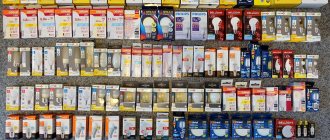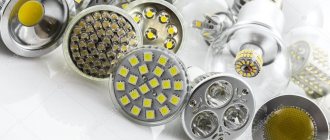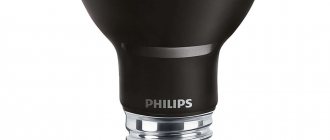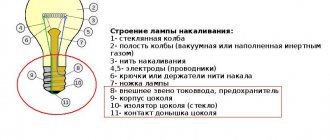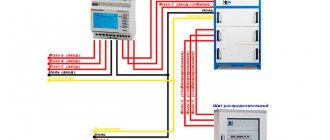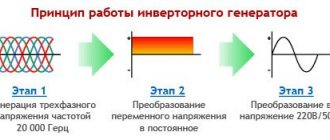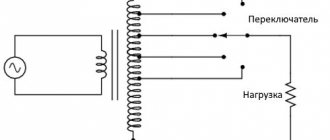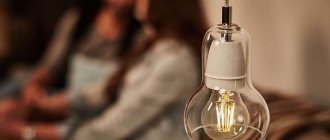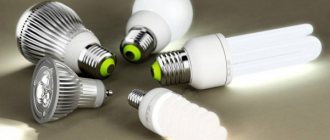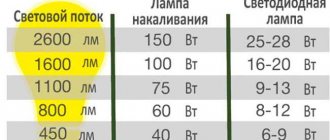High-tech filling, efficient light output and the undeniable economic benefits of LED bulbs leave competitors with similar functions far behind. Nowadays, most consumers choose these light sources.
LED lamps e14 are most in demand in everyday life - they are used to organize decorative, main and accent lighting in rooms. However, in order for an LED lamp to be as comfortable to use as possible, it is necessary to choose it wisely.
Before purchasing, you should evaluate the characteristics of the lamps and compare them with the upcoming operating conditions. The manufacturer will also play an important role. We will help you decide on the appropriate option - the article provides all the necessary information to choose the best e14 LED lamp.
Explanation of marking values
For a simpler understanding of the design features and technical characteristics, all existing modifications of LED lamps are divided according to the generally accepted classification. Devices are marked according to their intended purpose, type of base and device.
Marking is applied to the packaging taking into account established standards. After studying it, you can quickly get a clear idea of the capabilities of the device you are interested in.
The marking shows:
- power and brightness;
- maximum periods of continuous operation;
- degree of energy efficiency;
- flask variation;
- range of permissible operating temperatures;
- level of color rendering quality.
One of the main criteria that is used when choosing is the type of base.
The base is the most important part of the device, since it is responsible for the tightness of adhesion of the contacting metal elements and the quality of interaction with the electrical power circuit.
Any damage to the base makes the equipment sensitive to the slightest changes in current and voltage parameters. This threatens serious interruptions in the operation of the lamp, which will soon lead to complete failure
Soffit sockets are marked with the letter “S”, recessed contacts with “R”, pin contacts with “B”. Devices with a standard threaded connection, characteristic of conventional incandescent lamps, are assigned the letter “E”.
This symbol was chosen as a marking for a reason. It is borrowed from the name of the designer of the design - the famous inventor in the field of lighting technology, Edison.
LED light bulbs with the designation E14 are called “minions”. They differ from the common modification E27 only in the size parameters of the base.
The number next to the letter determines the diameter of the contacts, measured in millimeters. The connection of the light bulbs in question is 14 mm.
How to choose a lighting device
First of all, it is necessary to compare power. This will allow you to select a product with the optimal level of electricity consumption. At the same time, when comparing, it is necessary to remember that a 60-watt light bulb will shine much worse than a 100-watt one.
An equally important parameter is the luminous flux; it allows you to find out how many lumens are in the lamp. To link these two parameters, there is a special table showing the ratio of the power of an LED lamp to an incandescent or fluorescent lamp.
What kind of lighting do you prefer?
Built-in Chandelier
Analyzing such an equivalence table, we can conclude that a fluorescent LED lamp is the most efficient. Thus, a standard 60 W incandescent light bulb will illuminate the same as an energy-saving one with a consumption of 13-14 W or an LED with a power of only 6 W.
Comparison of incandescent and LED lamps is not in favor of the former and in terms of service life. Thus, a 40 W incandescent light bulb lasts only 1200 hours (on average). While LED can withstand 25,000 hours or up to 20 years of operation.
The selection process in the store will be greatly facilitated by the power table of energy-saving lamps, which allows you to evaluate the compliance of LED lamps with incandescent lamps. The luminous flux of fluorescent lamps is significantly higher than standard ones, but they also cost much more. This is their main disadvantage.
In addition, it should be borne in mind that, despite the same power of LED lamps, their brightness from different manufacturers can differ significantly, and calculating the correspondence between power and brightness is quite labor-intensive. Comparing the brightness and power of an incandescent lamp with its LED equivalent is quite difficult. For this you need special devices.
An important difference between incandescent light bulbs and LED lamps is that the former provide illumination evenly in all directions, while the latter have a directional luminous flux. Installing a diffuser to distribute the light more evenly will take some of the power away from the source.
Expert opinion
It-Technology, Electrical power and electronics specialist
Ask questions to the “Specialist for modernization of energy generation systems”
LED lamps for the home: how to choose, technical characteristics In addition to significant savings, the use of LED lamps carries additional advantages, in comparison not only with conventional samples, but also with other energy-saving halogen and fluorescent types. Ask, I'm in touch!
Comparison of minions with incandescent lamps
Numerous studies and tests of LED sources have repeatedly proven the fact that they outperform their traditional counterparts in all respects by a significant margin.
An LED lamp consists of a diffuser bulb, light-emitting elements, an aluminum radiator, and a polymer insulator. Light sources are mounted on a special printed circuit board, from which heat is transferred to the radiator
Comparing devices of representatives of LED and incandescent lamps with an identical E14 base, it is difficult not to notice a whole mountain of advantages of the former.
The advantages of LEDs include:
- energy consumption – LEDs consume almost 8 times less electricity;
- brightness - ordinary light bulbs produce dimmer light;
- service life – minions live three times longer;
- stability - voltage surges in the network do not provoke flickering of LED devices, which is harmful to vision.
In general, innovative lamps have only one drawback - a rather high cost. Most consumer reviews indicate that it quickly pays for itself and is compensated by many advantages.
Marking
The sockets are marked as follows - first there is a letter, then 2 numbers. The following types exist:
- B – pin;
- E – threaded, also called Edison base;
- G – pin;
- R – with recessed contacts;
- P – with focusing contacts;
- S – soffit;
- T – telephone connection;
- K – cable connection;
- W – baseless.
The number is the thread diameter in millimeters. To ensure compatibility, adapters have been created that allow you to install a lamp with an e27 base on an e14. Thanks to special adapters, you can install standard incandescent lamps in a socket with an E14 thread.
Main characteristics of the equipment
Before buying an LED light bulb for a chandelier, sconce or floor lamp, you should study its technical parameters in detail. Understanding the device and functionality will help you make the most correct choice in the future.
Structural forms of flasks
Models of E14 LED light bulbs differ in the shape of the bulb - a glass vessel that hides the light source. This part of the product is made of both transparent and frosted glass.
The type of design affects the direction, range and angle at which the lamp will emit light.
Pear-shaped devices . The most popular type of construction available on the market. They have a standard shape similar to incandescent lamps. The scope of application is practically unlimited.
Light bulbs with a cone lens are characterized by the ability to distribute light evenly. This form is ideal for installation in lighting fixtures equipped with a lampshade or lampshade.
Ball-shaped bulbs are similar to the previous modification, but provide a larger radius of illumination, which is important for spacious rooms.
However, due to their not particularly compact dimensions, the “balls” cause installation difficulties and are not suitable for every lighting fixture. They should be screwed into table lamps, and into those where they will be directed with the bulb down.
An elongated flask “candle” and “candle in the wind”, creating an imitation of a swaying flame. Often such lamps are installed in decorative lamps, wall sconces, and small chandeliers. The light from them emanates to the sides.
The lighting power from the front hemisphere depends on the top of the bulb: the more pointed it is, the less light gets out.
Corn bulbs are a completely separate species. The devices have this name because of the unusual arrangement of light sources, reminiscent of corn kernels.
They shine equally powerfully in the front and on the sides, making them optimal for general illumination of the space. Their glow angle is in the range of 220-270°
Experts believe that corn-shaped lamps have insufficient fire safety. This is due to the fact that the outer contacts of the LEDs in them are energized. It is advisable to install this model in a protective shade
The housing of LED devices can be presented not only in white, but also in gold, black, and silver.
It should be noted that the color performs purely aesthetic functions and does not affect the characteristics of the devices. By choosing one or another variation, you can advantageously complement and diversify the interior.
Color Temperature Ranges
In classic lamps, the color range is determined by an incandescent filament that maintains a certain temperature level. The tint spectrum in them is poor.
But LED sources have a much more interesting choice. They can glow warm yellow, neutral, cool white. This is possible thanks to phosphor - a special substance that is applied to LEDs.
The specific shade of the glow is determined by the temperature of the heated metal. To a lesser degree of heating, warm tones are formed, and to a greater degree, cold tones are formed.
The unit of measurement in the color temperature scale of LED lamps is Kelvin:
- 2700-3000 K – warm;
- 3500-4000 K – natural;
- 5500-6000 K – cold;
- over 6500 K – cold with a bluish tint.
In the dark, warm colors that are familiar and comfortable to the eyes are optimal for living spaces. They do not suppress the production of melatonin, which is important for the body.
Light in neutral white tones is suitable for artificial lighting during the day, will help increase reaction speed and improve attention
Cool white color is relevant for large public places, retail areas, zonal lighting of work areas, in which there are many small parts and moving objects.
Power and luminous flux
To make it easier for the buyer to navigate the power of LEDs, manufacturers indicate on the packaging the equivalent parameter of an incandescent light bulb.
Due to the small size of the base, E14 devices have rather limited power ratings. They are represented by three main values - 2, 4 and 6 Watts. The maximum power is 7 W.
But this does not mean at all that minions have poor light output. On the contrary, this feature indicates economical consumption of resources. Moreover, the brightness, for example, at 5-6 W will correspond to that produced by incandescent light bulbs at 40 W.
The amount of light produced by the source is determined by the efficiency of the light flux, measured in lumens per 1 W of power. The general luminescence range of LEDs is 50-130 lm/W, E14 products are 60-90 lm/W.
Even in devices that have the same power, efficiency can vary significantly. It is more expedient to compare different types of lamps based on the parameters of the light beam.
Manufacturers do not always indicate the glow efficiency of the lamp on the packaging. In this case, in order to correctly compare the characteristics and understand how the device will shine, you should use the table
If the calculated values do not agree with the standardized indicators and do not reach the required standard, it is recommended to increase the number of LEDs in the chandelier. This will allow you to achieve the required luminous efficiency coefficient.
You can also use the formula for calculations: multiply the power indicator of the light bulb by its characteristic luminescence range. For example, 6*(60 to 90) = 360 to 540 lumens.
The amount of light flux is additionally affected by the material from which the product’s bulb is made.
The matte body reduces the efficiency of the rays by up to 15-30%. In this regard, transparent flasks are more appropriate. But we should not forget that with direct eye contact they are dangerous to the eyes.
For more information on the characteristics and selection of LED light bulbs, see this article.
What types of lamps are there with this type of base and where are they used: features and parameters
E14 socket is used in incandescent, fluorescent, halogen and LED lamps. All of them are used in lighting devices, for illuminating refrigerators or microwave ovens. Bulbs of different types of E14 base will differ in size - products with incandescent filament are the smallest. Therefore, when purchasing devices, you should understand that they will look different in a chandelier.
The E14 also differs in shape. The most common type of light bulb is the “Candle”, which is used in ceiling chandeliers. Products in the shape of “Candle in the Wind” are installed in sconces - the top of the bulb is slightly elongated and curved.
“Fire flames” are more expensive and less popular forms of light bulbs. According to the manufacturer's idea, the bulb should be visible, so it makes no sense to use it in lighting fixtures with a lampshade.
TOP 5 manufacturers and models of lamps
The lighting technology market is full of various solutions and modifications of lighting sources. According to statistics, over the past year five brands have made it into the TOP of the best manufacturers. Products were evaluated based on technological content, functionality, and compliance with declared and actual characteristics.
Budget-friendly and reliable Canyon devices
The European company Canyon produces high-quality German-made lighting fixtures with standard bases suitable for various modifications of lighting equipment.
Consumers highlight the relatively low price as the main advantage of Canyon LED lamps. The disadvantages include insufficiently careful assembly and periodic pulsation during voltage surges
The presented models of the brand are manufactured according to the latest international requirements.
They are united by several advantages:
- a large selection of products in a different range of color temperatures;
- low heating level - only 80°, while the indicators of similar devices from other companies are 90-110°;
- the use of Chip On Board technology, which comprehensively protects internal elements from harmful external influences;
- five year warranty.
When testing the glow strength, users detected about 10% of the consumption with the declared indicators, which, taking into account the small measurement error, is not so critical.
One of the popular Canyon models with a 14 mm base is the matte LED B38 candle lamp, designed to consume 6 W of power, equivalent to 40 W of an ordinary lamp. Its light output is 470 lumens.
The Canyon lamp diffuses warm white light throughout the room and provides good color rendition. Unique Cob Ice module prevents overheating and maintains operational safety
The elegant design allows the device to be used in a variety of open chandelier models. Experts recommend installing a candle-shaped light bulb with the bulb facing up.
Innovative X-Flash light sources
X-Flash brand belongs to a Russian company that develops LED equipment for household, commercial and industrial use. During its short existence, it managed to become a successful player in the lighting technology market.
The brand’s laboratory produces powerful devices with advanced technical characteristics.
Thanks to continuous improvement, the company's LED lamps are endowed with a number of advantages:
- emission of comfortable light without flickering;
- high light output;
- stability of luminous flux parameters;
- extensive range;
- long service life.
The company's real hit of sales, which has exploded the market, are smart lamps, which are heavy-duty models for illuminating industrial facilities. They have built-in special photoresistors and motion sensors, making it possible to automate switching.
Not long ago, a particularly successful updated X-Flash with an E14 base was released. The luminous intensity indicators in it significantly exceed the limits established for products with a similar threaded connection. They amount to 820 Lumens.
In its new development, the X-Flash manufacturer managed to realize almost impossible technical characteristics, bypassing the limitations associated with the design features of a small base
The device has an elongated rectangular shape and shines 2-3 times better than its competitors. The color temperature falls between daytime white and warm tones.
The manufacturer provides a 5-year warranty and states that the light bulb can function properly for at least 43 thousand hours. Testing has shown that the promised parameters coincide with actual performance.
Inexpensive and high-quality Feron devices
Feron company has a reputation as a long-liver of the Russian lighting equipment market. It stands out for its affordable pricing policy and honest technical characteristics.
The company’s assortment includes more than 4 thousand items, which deserve trust due to the following nuances:
- intense and bright light;
- high-quality assembly;
- increased energy efficiency class;
- reliable electronic components;
- IC driver that protects against power surges.
Among the range of Feron lamps, the spherical model with 14 bases from the SAFFIT - SBG4507 . It has strong parameters - a power of 7 W and a light flux of 560 Lm. The light bulb produces a comfortable white light, close to the natural shade.
The brightness of the Feron SAFFIT light bulb exceeds the values of similar models by 15%. Matte diffuser softens harsh light rays, distributing light evenly throughout the room
The model ripples due to voltage drops are excluded. Subject to operating conditions, the lamp will operate for about 30 thousand hours.
The manufacturer provides a three-year warranty period for it. Most often, this modification is installed in recessed spotlights.
Safe and technological solutions Era
The domestic brand “Era” has been producing electrical products for the second decade. The main motto of the production is the use of modern technological principles, suggesting improved safety and increased energy savings.
Among the advantages of Era LED devices:
- large radiation angle;
- good color rendering;
- long service life;
- robust design.
As for the disadvantages, many consumers complain that the manufacturer slightly overestimates the power equivalent in relation to devices with filaments.
The brand's best seller is a model with an E14 LED smd R50 base from the ECO series. Its continuous service life is about 25 thousand hours. The product shines with a soft warm light. Light output power – 420 lumens
In general, the parameters correspond to the characteristics of products with incandescent filament, equipped with a power of 40 W. fulfills warranty obligations in case of product failure within one year from the date of sale.
Jazzway universal products
The well-known company JAZZWAY produces reliable LED products in more than 1,500 positions. The assortment includes all types of lighting solutions, divided into categories: economy, standard, combi.
During production, the brand conducts independent examinations and effective multi-stage quality control.
As a result, you receive certified JAZZWAY products with many advantages:
- long service life;
- good color rendering;
- safe and durable packaging;
- emit flicker-free, even light.
, the PLED-ECO-C37 model deserves attention , producing natural white lighting. Normal operation of the device is maintained within the temperature range from -20° to +40°.
With a power of 5 W, the luminous flux of the bulb is 300 lumens. The design of the product body consists of durable plastic materials
Its dispersion angle is average – 190°. Analyzing consumer reviews, it becomes clear that this model rarely breaks down. If any problems do arise, a two-year manufacturer's warranty is provided in this case.
Chuck selection
Despite the fact that the E14 LED lamp has the ability to maintain a stable operating temperature and also has protection against overheating, it is better to give preference when choosing this lighting option to ceramic and porcelain sockets.
Porcelain cartridges have a longer service life compared to plastic counterparts. The most common ceramic sockets for E14 lamps consist of a ceramic body, copper or brass blades attached to screw contacts, a spring and a skirt into which the base is screwed.
Often the most problematic element of the cartridge is the skirt. Choosing a chuck with a soft aluminum skirt can be quite a hassle. The malleability of such metal leads to the appearance of small burrs when the lamp is screwed in and out. Often this element of the cartridge simply remains on the base when unscrewed.
In order for the E14 LED lamp to serve for as long as possible, it is better to select a ceramic socket with a steel or stainless steel skirt for it. At the same time, you should avoid buying cartridges with yellow metal elements, which is typical for parts made of the least durable and short-lived anodized aluminum.
Useful tips Connection diagrams Principles of operation of devices Main concepts Meters from Energomer Precautions Incandescent lamps Video instructions for the master Testing with a multimeter
Useful recommendations for choosing
To summarize the review, we can highlight several points that will greatly facilitate the selection of a suitable LED light bulb model with a standard base.
Firstly , the type of socket installed in the lighting equipment must correspond to the size of the base of the lamp being purchased. For sockets E 14 and 27 there are special adapters.
Secondly , additional savings on purchases are not always advisable. Cheap light bulbs sold by unreliable brands often fail. Trusted manufacturers are responsible for the quality of the product and guarantee replacement or repair of the product in case of breakdowns.
Lighting equipment equipped with a matte bulb is ideal for organizing softer and more subdued lighting in a room that does not irritate the eyes. If the room requires a bright light source, it is more advisable to buy LED lamps with a transparent bulb
Thirdly , light sources with filament or fluorescent light bulbs must be correctly replaced with LEDs, selecting a similar luminous flux power. In this case, you can refer to the table above.
Before purchasing, you need to check whether the light bulb is pulsating during operation. Having discovered such a phenomenon, it is advisable to discard the device, since its control circuit is imperfect.
Rules for selecting a base for LED lamps
In order not to make a mistake when purchasing a holder for an LED lamp, you need to consider a number of important points:
- Factor No. 1 is the voltage in the electrical network. A certain type of connector can only work with the appropriate voltage. So, for example, models E17 and E26 are not suitable for a 220 V network - only 110 V. At the same time, G9 will only work at 220 V.
- The sockets of LED lamps E14 and E27 cannot be used in a circuit with dimmers.
- If a lamp with a pin holder fails, it does not need to be thrown away immediately. Pins are those unique features by which you can find exactly the same specimen in the store.
- When selecting connecting connectors, you should always take into account the rated power of the entire luminaire.
Thematic video.
